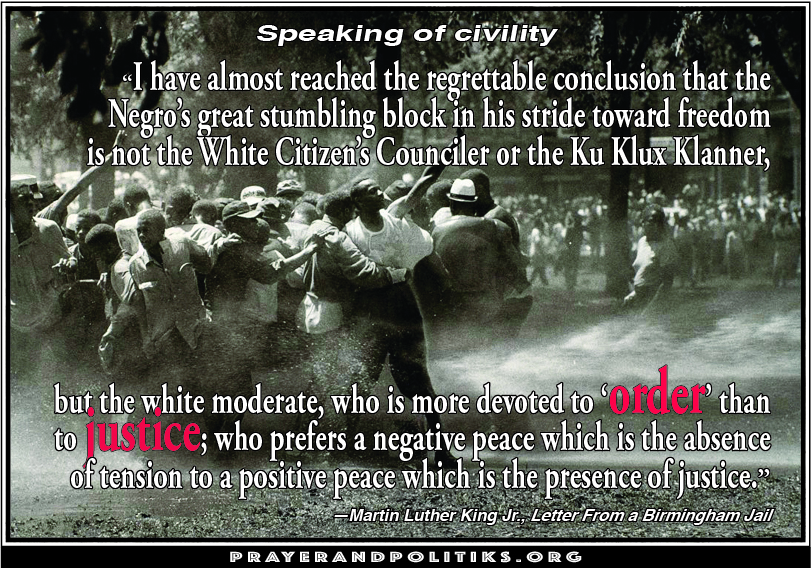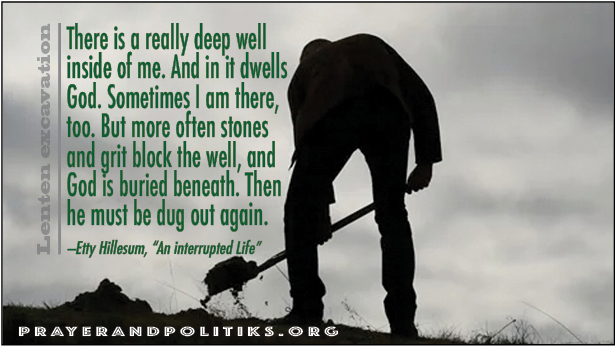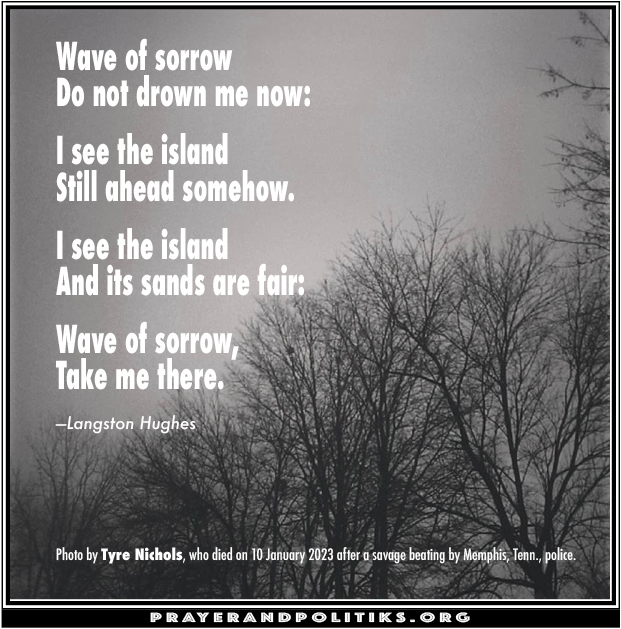Ken Sehested
Preface
As I write, the fifth day of Eastertide (which began on Easter eve ending 50 days later on Pentecost Sunday) draws close. As does the moment in 1968 when Dr. Martin Luther King Jr. was assassinated while standing just outside his Lorraine Hotel’s second floor room in Memphis, Tennessee.
It was 6:01 p.m. CST. The fourth of April. Barely a half-century ago. He was 39 years old.
Just before a bullet found his jaw, he called out to one of his associates in the parking lot below, saying “make sure we sing Precious Lord tonight.”
§ § §
Precious Lord, take my hand, lead me on, let me stand. . . .
§ § §
He had come to Memphis to support the city’s majority-black sanitation workers strike for better pay and working conditions. The Southern Christian Leadership Conference (SCLC) staff and advisors opposed his decision, saying he needed to focus on the upcoming Poor People’s March in Washington, D.C. King’s outspoken opposition to the Vietnam war was a public relations nightmare for him and the SCLC. His public disapproval rating had risen to 75%.
A week before he participated in a workers’ march in Memphis which, dismally, ended in violence. Then, returning on 3 April, a bomb threat targeted King’s plane in Atlanta before it departed. He was so exhausted when he reached Memphis, he decided to skip that night’s mass meeting in support of the strikers, at the massive 7,500-seat sanctuary at Mason Temple Church of God In Christ.
Despite a massive thunderstorm that evening, the church house was crowded. Rev. Ralph Abernathy, his closest confidant and traveling companion, called King, saying the people needed to hear from him. Reluctantly, he went. And subsequently spoke extemporaneously for 40 minutes, in what we now remember as his soaring “I’ve Been to the Mountaintop” speech, which was eerily foreboding (“I may not get there with you”) but also electrifying for the assembled crowd.
[Here’s a brief (2:37 video) excerpt of the speech’s key lines. The full version, and longer excerpts, are easy to find online. For more background, see “An ‘Exhausted’ Martin Luther King Jr.’s Final 31 Hours,” NPR.]
He nearly fainted when he finished. Abernathy and others had to help him into his chair on the podium.
§ § §
I am tired, I am weak, I am worn. . . .
§ § §
In the days following his assassination, riots broke out in 100 cities across the U.S. The historic Civil Right Act of 1964 and the Voting Rights Act of 1965 have largely been gutted in this century by the U.S. Supreme Court. Only 11 years ago, with the formation of the Black Lives Matter movement, we as a nation have been confronted with, and confounded by, the ways in which the “I Have a Dream” moment has been repeatedly delayed, diminished, and sometimes ruthlessly opposed.
In an interview with NBC in May 1967, King admitted that the “dream” of his historic 1963 speech had in some ways “turned into a nightmare.”
The reckoning still menaces.
In 2017 civil rights advocate Marian Wright Edelman wrote that earlier in the day King was shot, he phoned his mother to give her his coming Sunday’s sermon title at Ebenezer Baptist in Atlanta, where he co-pastored with his father: “Why America May Go to Hell,” summarizing that “America is going to hell if we don’t use her vast resources to end poverty and make it possible for all of God’s children to have the basic necessities of life.”
§ § §
Through the storm, through the night, lead me on to the light. . . .
§ § §
I’ve long been fascinated by the enormous discoveries neuroscientists have made in recent decades about how the human brain works. Recently I came across this article, “Where Imagination Lives In Your Brain?” subtitled “The ability to conjure up possible futures or alternative realities is the flip side of memory. Both faculties cohabit in the brain region called the hippocampus.”
Or, more lyrically, as French philosopher Paul Ricoeur wrote in the last century, “If you want to change people’s obedience then you must change their imagination.”
These findings corroborate Hebrew Scripture’s insistence that the worst sin is amnesia. The “Ten Commandments” are delivered with this authorizing premise, “I am the Lord your God, who brought you out of the land of Egypt, out of the house of slavery, therefore. . . . “ (Deut. 20:2).
It’s the therefore premise which should occupy people of faith. Worship is the work of deciding and maintaining an orientation to worthiness, clarifying why we do what we do, illuminated by immersion in our texts alongside the voices of those with no claim to the table of bounty. The how—the roadmap to the Beloved Community—must be negotiated in the public arena with other people of faith and conscience. The Little Flock of Jesus has no privileged information on policy prescriptions.
Memory is the precursor to obedience (whose root word means “to pay attention”). And imagination, for a faithful future of flourishing, is directly tied to memory.
Listen. Pay attention. Remember who you are. “Do this in memory of me” (Luke 22:19) is part of the Christian Eucharistic mandate.
Arguably, the most important book on the modern Civil Right Movement is Vincent Hardings’ Hope and History: Why We Must Share the Story of the Movement. That’s the motivating spirit behind this (obviously subjective) compilation of musical selections remembering Dr. King.
Not him simply as a solitary hero, but as one whose name is a shorthand way of memorializing a mass movement that included a host of other luminaries and (this is especially important) a countless list of other individuals—threatened and bullied, arrested or lynched, or in some large or small way inconvenienced for the sake of the Beloved Community—whose names and stories are largely lost to history. But are no less cherished in the heart of God.
As preface to these suggestions: If you listen to only one recording, make it the first one, which isn’t a song (but is a melodic offering). It’s a recording of Dr. King’s account of his “kitchen table conversion.” While the urgency of a heavy lift for new social policies is real, at root there must also involve a conversion of the “heart,” both to embolden the policy demands and sustain them once approved—and refined, as needed, in every new season.
In the ungrammatical but theologically profound words of Mother Pollard, who faithfully participated in the 381-day bus boycott in Montgomery, Alabama, when asked how she was holding up having to walk to work, responded: “My feets is tired but my soul is rested.”
Allow these soul-resting tunes to sustain your weary feet.
§ § §
Take my hand, precious Lord, lead me home.
—Thomas A. Dorsey
§ § §
¶ “The kitchen prayer of Dr. Martin Luther King Jr.” (4:26) —Poignant account of how he came close to giving up under the pressure of threats to him, his wife, and infant daughter
¶ “Early morning, April four / Shot rings out in the Memphis sky. / Free at last, they took your life / They could not take your pride. / In the name of love / What more in the name of love.” —“Pride (In the Name of Love),” U2
¶ “The Ballad of Martin Luther King.” —Brother Kirk, Pete Seeger and Sesame Street kids.
¶ “I got a dream / We gonna work it out . . . / I got a dream / That one day / I’m a look deep within myself, I gotta find a way.” —“A Dream,” Common
¶ “Let us turn our thoughts today to Martin Luther King / and recognize that there are ties between us, / all men and women living on the Earth. / Ties of hope and love, sister and brotherhood, / that we are bound together / in our desire to see the world become / a place in which our children can grow free and strong. / We are bound together by the task that stands before us / and the road that lies ahead. / We are bound and we are bound.” —James Taylor, “Shed a Little Light”
¶ “Sleep, sleep tonight / And may your dreams be realized. / If the thunder cloud passes rain / So let it rain, rain down on he. / So let it be. / So let it. “ —“MLK,” U2’s song in honor of Martin Luther King Jr., performed by Darrell Adams
¶ “One Day.” —Bakermat (I Have A Dream REMIX)
¶ “Oh Freedom.” —The Golden Gospel Singers
¶ Ken Medema. —13-minuted performance for a Martin Luther King commemorative service at Marble Collegiate Church, New York City
¶ “Ain’t Gonna Let Nobody Turn Me Around.” —Freedom Singers perform at the White House. Bernice Johnson Reagon, looking directly at President Barack and Michelle Obama, says to them and the gathered guests “you have to actually sing [not just listen to] this song.”
¶ “We Shall Overcome.” —Morehouse College Glee Club
¶ “Sing About Martin.” —kids’ song
¶ “Now the war is not over, victory isn’t won / And we’ll fight on to the finish, then when it’s all done / We’ll cry glory, oh glory.” —“Glory,” John Legend
¶ “I’d rather stand tall / Than live on my knees / ‘Cause I’m a conqueror / And I won’t accept defeat / Try telling me no / One thing about me / Is I’m a conqueror.” — “I Am a ‘Conqueror,” Estelle Pays Tribute To Dr. Martin Luther King Jr.
¶ “Soon I will be done / With the troubles of the world . . . / I’m going home to live with God.” —“Soon I Will Be Done,” Arkansas Gospel Music Heritage, featuring Bethany (Which is not, as some would say, a resignation or abdication from history, but the essential assurance of a Presence and a Promise that sustains in the midst of tribulation on the rugged, bandit-threatened road to the Beloved Community.)
Postscript
“Queen of Gospel” singer Mahalia Jackson often traveled with King using her powerful music on the civil rights circuit. Sitting near King during his famous speech at the Lincoln Memorial, she prompted him to drop his prepared manuscript, saying “tell them about the dream Martin.” Which he did. Jackson, therefore, should be partially credited for prompting what is now considered the top American speech of the 20th century and, arguably, “the greatest in the English language of all time.” Here’s her rendition of “Precious Lord.”
# # #




 Thanks to our talented guest artist, Kenn Comptom—creator many years ago of prayerandpolitiks’ guardian angel—Gabriel has gotten a needed much needed makeover. (See above.) Gabriel advised me to raise funds by sponsoring a contest with readers suggesting a last name for him. I had to tell him that . . . well . . . we just don’t do that sort of thing.
Thanks to our talented guest artist, Kenn Comptom—creator many years ago of prayerandpolitiks’ guardian angel—Gabriel has gotten a needed much needed makeover. (See above.) Gabriel advised me to raise funds by sponsoring a contest with readers suggesting a last name for him. I had to tell him that . . . well . . . we just don’t do that sort of thing.





